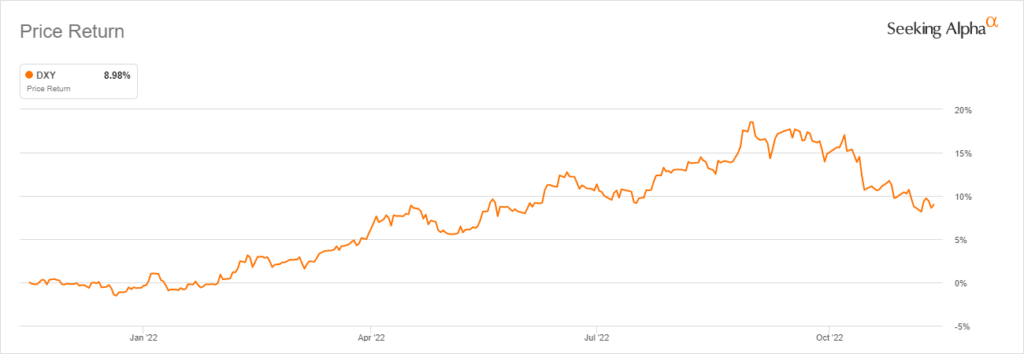BMO Sees China with Historically Low Inventory Levels, as the World Shifts away from Reliance on China and Russia
On December 5th, BMO Capital Markets released their key themes for metals and mining heading into 2023. They name several themes that they say will be “influential in 2023, over and above individual market dynamics.” Their highest rates key themes are developments in China demand, geopolitical segmentation, inventory levels, and supply growth.
The first is the double duo of inflation passing from goods to services and an expected weaker U.S. dollar. First, BMO’s analysts expect that the demand for goods to be weak, citing the pull-forward of spending during the pandemic. Though they don’t expect this to be shown in the official CPI as they expect inflation will just move from durable goods to service prices. BMO is also forecasting that the U.S. dollar will erase more gains, as it has dropped roughly 5% from its peak already, in the face of a more tempered Fed.

Thoughts on China
On China, BMO provides three different key themes. The first is that they believe China is starting to flip its stance on the property sector, writing, “When you hear of sixteen distinct policies to boost the property sector signed off by the PBOC and banking regulator, it sounds significant.”
Though BMO still believes that 2023 could see a more muted new start, they believe that China’s messaging has changed over the last few months, saying, “it does feel like there is no real impetus to get the property sector going.” They also make note that 2023 remains robust for consumers in China as they have not been hit as hard by inflation as other G20 countries and as a result, the consumers have access to ample amounts of credit.
READ: This Week In China: Easing COVID Policies, Boosting Property Market, Visiting Saudi Oil
One of the things that BMO’s metal and minings team finds the most important and that has a large impact in the short term is the potential inventory build that happens during this time and around the Chinese new year. They note that generally, inventory levels are still slightly elevated relative to “recent norms,” but for raw materials, the inventory levels are “extraordinarily low.”
They believe this is a factor of many things, one being general inflation and interest rates, which makes holding onto inventory and materials more expensive and “lack confidence in your supply chains.” They also believe there has been some inventory shift from “visible to invisible,” such as the consumers “holding” onto more goods than normal.
Deglobalization A Thing
The last key theme BMO touches on is the de-globalization that the world is currently facing, writing, “With geopolitical tensions high, and security of commodity supply into core value chains rising in terms of strategic importance.” BMO expects that the world will try to move away from having a key reliance on certain goods and services away from China and Russia. If this were to happen, the supply for some of these goods would see supply drop. In turn, they would expect the prices for those supplies to go up in price and expects this to “drive higher regional premia across industrial metals.”
READ: Apple Speeds Up Pulling iPhone Manufacturing Out Of China
Information for this briefing was found via the provided sources. The author has no securities or affiliations related to this organization. Not a recommendation to buy or sell. Always do additional research and consult a professional before purchasing a security. The author holds no licenses.









